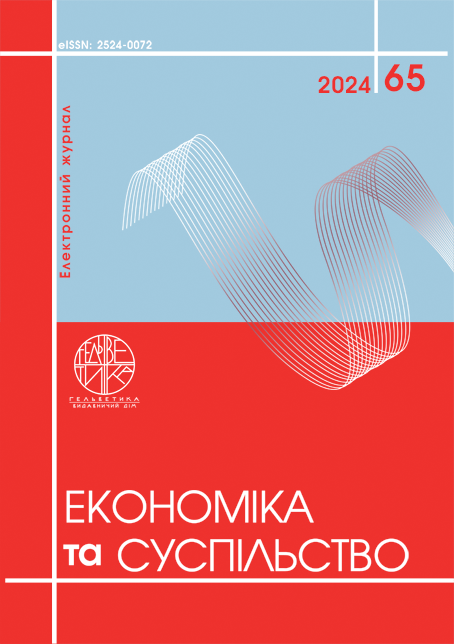THE IMPACT OF HYBRID WORK ENVIRONMENT ON PERSONNEL MANAGEMENT EFFECTIVENESS
Abstract
This article explores the hybrid work environment, which integrates remote and office-based work, as a prominent trend in contemporary personnel management. The hybrid model, which has gained significant traction following the COVID-19 pandemic, offers substantial potential for enhancing flexibility in scheduling and work locations. This flexibility enables employees to better balance their professional responsibilities with personal life, potentially reducing stress associated with daily commutes and improving overall productivity and job satisfaction. Despite its advantages, the hybrid work environment introduces new challenges. Ensuring equitable access to resources and opportunities for all team members becomes crucial, as does developing innovative approaches to performance management and evaluation. Traditional methods of performance control and monitoring may not be effective in a hybrid format, necessitating the creation and implementation of new criteria and tools for assessing employee performance. Additionally, the hybrid work model requires a multifaceted approach for successful implementation. This includes adopting advanced technological solutions to facilitate seamless communication and collaboration, fostering a supportive corporate culture that accommodates diverse working styles, and adjusting management practices to align with the hybrid work setup. The article examines these aspects in detail, highlighting the need for organizations to embrace technological advancements, cultural adjustments, and procedural modifications to fully capitalize on the benefits of the hybrid work model. Through an in-depth analysis, the article offers practical strategies for overcoming the inherent challenges of hybrid work environments. It emphasizes the importance of a balanced approach to managing hybrid teams, ensuring that both the technological and human factors are effectively addressed to maximize the potential benefits. By adopting these strategies, organizations can enhance their operational efficiency, employee satisfaction, and overall success in the evolving landscape of work.
References
Петренко І. Гібридне робоче середовище: можливості та виклики для організацій в Україні. Вісник Національного університету "Острозька академія". 2022. Т. 15, № 2. С. 45–59.
Smith A., Johnson B. Hybrid Work Environments and Employee Satisfaction. Journal of Business Research. 2021. Vol. 58, № 3. P. 203–215.
Lee C. Effective Communication Strategies in Hybrid Work Settings. Management Review Quarterly. 2022. Vol. 44, № 1. P. 55–68.
Коваленко А. Вплив гібридної роботи на баланс між професійним і особистим життям: український контекст. Психологія і Соціальні Технології. 2023. Т. 19, № 1. С. 32–46.
Gomez R., Wang T. Challenges of Remote Work and Team Integration. International Journal of Human Resource Management. 2023. Vol. 34, № 2. P. 145–160.
Морозова Т. Кібербезпека в умовах віддаленої роботи: аналіз загроз і рекомендації. Інформаційні Технології та Безпека. 2023. Т. 11, № 3. С. 89–101.
Miller J., Brown L., Patel S. Technology and Productivity in Hybrid Work Models. Technology Management Journal. 2022. Vol. 29, № 4. P. 76–89.
Кравченко В. Сучасні підходи до управління гібридними командами в Україні. Управлінський журнал. 2024. Т. 22, № 1. С. 78–91.
Лукашев О. Корпоративна культура в умовах гібридної роботи: як зберегти командний дух. Бізнес та Соціальні Дослідження. 2023. Т. 14, № 4. С. 62–75.
Petrenko, I. (2022). Hibrydne roboche seredovyshche: mozhlyvosti ta vyklyky dlia orhanizatsii v Ukraini. [Hybrid Work Environment: Opportunities and Challenges for Organizations in Ukraine]. Visnyk of Ostroh Academy National University, vol. 15(2), pp. 45–59.
Smith, A., & Johnson, B. (2021). Hybrid Work Environments and Employee Satisfaction. Journal of Business Research, vol. 58(3), pp. 203–215.
Lee, C. (2022). Effective Communication Strategies in Hybrid Work Settings. Management Review Quarterly, vol. 44(1), pp. 55–68.
Kovalenco, A. (2023). Vplyv hibrydnoi roboty na balans mizh profesiinym i osobystym zhyttiam: ukrainskyi kontekst [The Impact of Hybrid Work on Work-Life Balance: The Ukrainian Context]. Psychology and Social Technologies, vol. 19(1), pp. 32–46.
Gomez, R., & Wang, T. (2023). Challenges of Remote Work and Team Integration. International Journal of Human Resource Management, 34(2), 145-160.
Morozova, T. (2023). Kiberbezpeka v umovakh viddalenoi roboty: analiz zahroz i rekomendatsii [Cybersecurity in Remote Work Conditions: Threat Analysis and Recommendations]. Information Technologies and Security, vol. 11(3), pp. 89–101.
Miller, J., Brown, L., & Patel, S. (2022). Technology and Productivity in Hybrid Work Models. Technology Management Journal, 29(4), 76-89.
Kravchenko, V. (2024). Suchasni pidkhody do upravlinnia hibrydnymy komandamy v Ukraini [Modern Approaches to Managing Hybrid Teams in Ukraine]. Management Journal, vol. 22(1), pp. 78–91.
Lukashev, O. (2023). Corporate Culture in Hybrid Work Conditions: How to Maintain Team Spirit. Business and Social Studies, vol. 14(4), pp. 62–75.

This work is licensed under a Creative Commons Attribution 4.0 International License.


